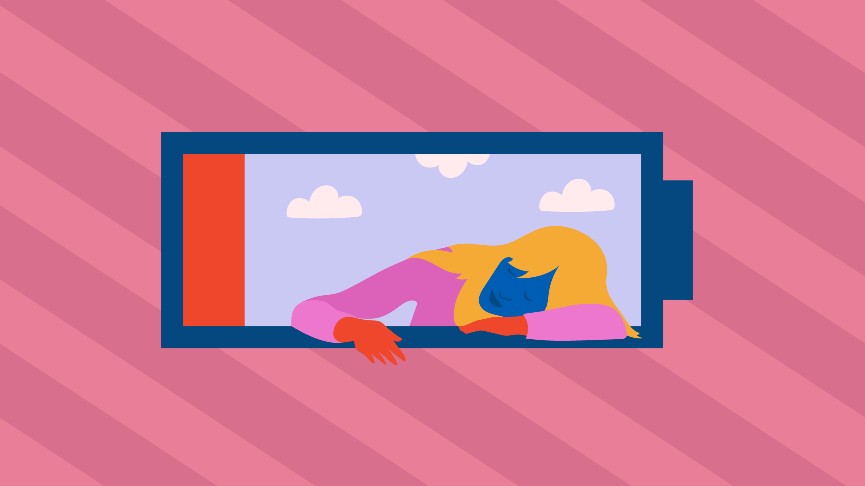Menstrual Fatigue: Why Am I So Tired on My Period?

Do you find yourself dragging to get out of bed while on your period, only to collapse back into it as soon as possible?
Menstrual fatigue is totally normal, and it doesn’t mean anything is wrong with you.
Menstrual fatigue can happen before or during your period – or both.
The sheer exhaustion of it can make it difficult to carry on with work and everyday tasks.
Even though it’s normal, you still may be wondering why it happens, and if there’s anything you can do to combat it.
What Causes Fatigue During Period?
Hormones
Like many bodily operations, menstrual fatigue can partly be attributed to hormonal fluctuations.
Your estrogen levels rise before ovulation to support a potential embryo, and then drop when fertilization doesn’t occur. Since estrogen can make you feel energetic and alert, this sudden change can leave you feeling tired and weary.
In the case of estrogen dominance, estrogen levels in the body outweigh progesterone. Progesterone is necessary for regulating your period, and keeping symptoms of high estrogen in check. When this delicate hormonal balance is off, you may feel extra fatigued.
Period Ouchies
Pain is exhausting, there’s no doubt about that. If you get period cramps, whether mild to severe, they can leave you feeling extra fatigued.
You can try these natural remedies for period cramps, or reach for ibuprofen if that works for your body.
Underlying Conditions
For people with conditions like endometriosis or PCOS, menstrual symptoms can be that much more intense. Along with potentially irregular periods, intense cramps, and heavy flows, people with reproductive health disorders may experience extreme menstrual fatigue.
Other conditions that could cause menstrual fatigue include thyroid disorders. The thyroid is a tiny gland that helps regulate normal bodily processes, like your metabolism, as well as hormone function.
Symptoms from thyroid disorders can be exacerbated during menstruation.
People with chronically low iron levels, AKA anemia, may feel even more tired when on their period. People who menstruate, are more likely to develop iron-deficiency anemia. Iron helps to create hemoglobin, which helps red blood cells carry oxygen throughout your body.
Without high enough oxygen levels going through your bloodstream, you may find yourself feeling extra tired. A common symptom of anemia.
When you’re bleeding and losing even more red blood cells, this anemia induced fatigue can be that much more intense.
How to Deal with Menstrual Fatigue
The first step to dealing with period exhaustion is to understand where it’s coming from.
While you might not be able to get to the bottom of it, there are some steps you can take to help you figure it out.
Consult Your Doctor
If your period fatigue feels unmanageable, or is greatly interfering with your daily period life, ask your doctor. Keep track of other symptoms you’re experiencing like cramps, nausea, and bloating. It’s also helpful to track when around your period you tend to feel the most tired.
Get Your Mineral Levels Tested
Your body depends on essential minerals, like iron and magnesium, to stay healthy and vital. When these are low, like in the case of anemia, period symptoms can be worsened.
Ask your provider about getting these tested. If they are low, taking supplements, and eating mineral rich foods, can help combat menstrual fatigue.
Avoid Caffeine and Sugar
While it can be awfully tempting to reach for a third cup of coffee and a sugary treat while on your period, it may be counterproductive towards your energy levels.
You may feel a short uptick of energy, followed by a big crash, making menstrual fatigue that much more unbearable.
Instead try drinking a mellow green tea, and munching on a sugar-free dark chocolate bar.
Holistic Practitioners
There’s plenty of holistic health modalities that have a variety of tools to help you manage menstrual fatigue, and other period symptoms.
Chinese medicine practitioners use acupuncture, herbalism, and other methods to help regulate period symptoms. Functional medicine doctors and providers combine allopathic medicine with more natural remedies to help treat period symptoms on a holistic level.
Plan Ahead
While this may be easier said than done, try to plan ahead.
Some level of menstrual fatigue may be inevitable, so if you have the ability to schedule your days to accommodate this, it can keep you from feeling so overwhelmed.
Try tracking your cycle, so that you know when you tend to be the most fatigued. Avoid scheduling meetings, due dates, and social gatherings around these times.
Be easy on yourself, if you can’t totally relax, it’s ok to do the bare minimum, before retiring for the day
One of the best period self-care tips we can give is to listen to your body. If you need extra rest on your period, please do your best to do that. You deserve it.

Natasha (she/her) is a full-spectrum doula and health+wellness copywriter. Her work focuses on deconstructing the shame, stigma, and barriers people carry around birth, sex, health, and beyond, to help people navigate through their lives with more education and empowerment. You can connect with Natasha on IG @natasha.s.weiss.


